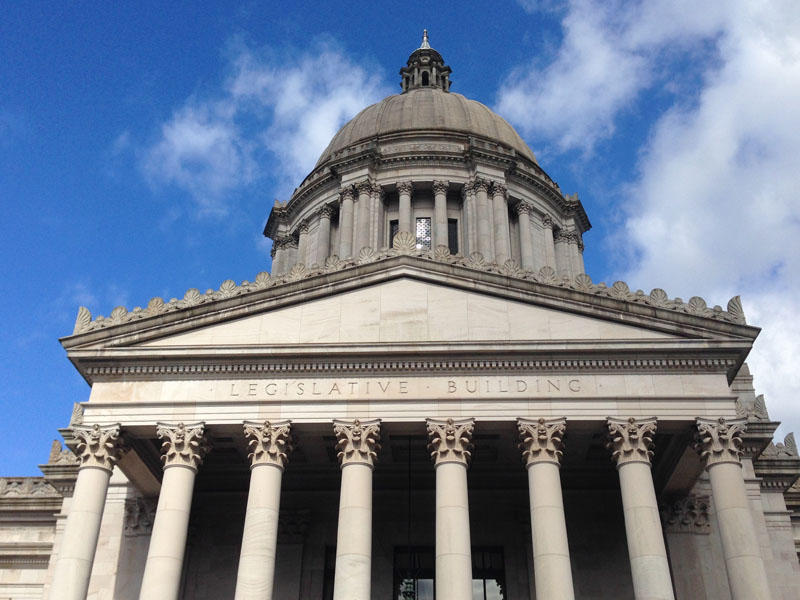Mr Carlson: I had one of my disc jockeys, Dr Johnny Fever, give me the lyrics to a song. He wants to know if you’d let him play that song on the air.
Dr Bob, reading: “Imagine there’s no heaven, it’s easy if you try. No hell below us, above us only sky. Nothing to kill or die for, and no religion too. Imagine no possessions[?] Imagine all the people sharing all the world[?]” That sounds like communism to me: if there’s no heaven, and no religion, then, I assume, no God.
Mr Carlson: There’s not an obscene word in here.
Dr Bob: Not the way I see it.
Mr Carlson: Does it go on your list?
Dr Bob: Arthur, this is typical of the kind of secular, liberal humanist point of view that gluts our airwaves.
Mr Carlson: Yeah, but we’re not talking obscenities here anymore, Bob, we’re talking about ideas — political, philosophical ideas. First you censor a word, and then you censor the idea.
Dr Bob: The idea is man-centered. [A]rthur, this song says there’s no heaven.
Mr Carlson: Ah. No, it says just imagine there’s no heaven.
Dr Bob: That’s blasphemy.
Mr Carlson: On the list or not?
Dr Bob: I have no choice but to say on.
Mr Carlson: That decision was made by one man.
— WKRP In Cincinnati, “Clean Up Radio Everywhere”
In Florida, publisher Julia Hanway of the Wakulla Independent Reporter pulled the plug on her newspaper, not for lack of revenue, but because one staffer at the Florida Elections Commission called the paper an unreported “electioneering communication.” The Reporter was a small newspaper like many others, “[c]rammed with color photos of nature scenes, book reviews, profiles of County Commission candidates and growth-management reports[;] a stylish looking four-page broadsheet.” Jim Ash, “Wakulla Independent Faces Uncertain Future”, Tallahassee Democrat, May 28, 2006. Though the Reporter endorsed no candidates, a retired businessman “felt a responsibiilty to come forward because he wanted to fight what he considered to a be a deceptive publication supporting ‘no-growth’ candidates.” Jim Ash, “Groups File Suit for Wakulla newspaper Owner”, FloridaToday.com, August 31, 2006.
The Reporter was destined for trouble when Florida replaced its express advocacy standard for reporting and disclosure with an “electioneering communication” standard requiring mere mention of a candidate that can reach voters. Newspaper commentary is exempt. But now that Hanway can no longer avoid a standard everyone can understand and still report on candidates, that quickly becomes the question: Is the Reporter a newspaper?
Yet, the Commission’s handling of the matter left Hanway in limbo by leaving the salient question open and begging the question whether some at the Commission would prefer, without saying so, that Hanway stop using the Reporter as a vehicle for speaking about ‘pro-growth’ candidates and issues:
“Under the circumstances, I recommend that the Commission find no probable cause that the respondent violated … Florida statutes,” wrote commission general counsel Charles Finkel. “However, the respondents are now on notice that the Commission considers the Wakulla Independent Reporter … to be an electioneering communication [and not a protected newspaper].” …
Finkel said [Florida] Commissioners dismissed the case without making a formal finding about what the Reporter actually is. He said he made his recommendation based on his interpretation of the election laws and what was presented to him by investigators. It’s up to Hanway to decide whether she can continue publishing, Finkel said.
“It was not necessary for the Commission to even discuss that issue,” he said. “That’s a matter she needs to take up with her attorney.”
Hanway said the ominous wording of the report was enough to persuade her to pull the plug.
Jim Ash, supra (emphasis added). The ACLU has filed suit on Hanway’s behalf.
A similar half-measure by a trial judge, who made no finding against Fisher Communications/KVI Seattle, nonetheless hogtied Fisher which, in covering a gas tax initiative before the citizens of Washington state, could not decide where “support” begins or ends. The Brief of the Institute for Justice, counsel to the initiative committee, explains the predicament of the radio station.
In 2005, the Legislature, in a controversial move, increased the state’s gasoline tax. The increase sparked a public debate among media commentators as soon as it was passed. In Seattle, radio talk show hosts John Carlson and Kirby Wilbur of 570 KVI AM were immediate and outspoken critics of the tax. On the other side, practically every Washington newspaper supported the tax increase. Opponents soon organized an inititative campaign to repeal the increase and formed a political committee, NoNewGasTax (NNGT) to promote it. A coalition of business, labor, legal, and environmental organizations soon responded by forming Keep Washington Rolling to defeat the initiative. The law firm of Foster, Pepper, & Schefelman, PLLC (“Foster”) also joined as a member of Keep Washington Rolling.
Keep Washington Rolling contacted Foster seeking to file a lawsuit against NNGT under Washington’s Fair Campaign Practices Act for failing to disclose … alleged contributions, including Carlson and Wilbur’s on-air discussions about the initiative. Foster then solicited San Juan County [and several municipalities] — all of which stood to gain millions (if not billions) of dollars in State tax revenue if the initiative failed and the new tax prevailed — to act as plaintiffs in the suit. Foster agreed to represent the Municipalities free of charge.
[T]wo weeks before the … deadline to qualify [the initiative] for the ballot, Foster and the Municipalities filed their action against NNGT. They did so “by and through” Foster, who purported to act “on behalf of the State of Washington.” [K]eep Washington Rolling issued the press release announcing the suit and identified San Juan County Prosecuting Attorney Randall Gaylord as its point of contact. In the release, he explained that the desire for more tax revenue [rather than a dispassionate prosecution of the law] motivated San Juan’s participation in the suit: “As a county, we have a lot at stake. We depend on a healthy transportation network, and the transportation package is a fair way to pay for it.”
Foster also wanted to stop the initiative. Foster was a member of Keep Washington Rolling and donated $2500 to Keep Washington Rolling two days after the suit was filed. Foster was also bond counsel for the State and would receive the legal work for the State’s bonds guaranteed by new tax revenues. With no tax, there would be no bond issuance and fewer fees for Foster.
The Municipalities alleged that Wilbur and Carlson’s on-air discussions constituted “in-kind contributions” to NNGT [that must be reported]. The complaint sought to enjoin NNGT, preliminarily and permanently, from “depositing, using, or expending contributions,” and from accepting any additional “in-kind contributions” from Fisher Communications, the owner of KVI, until NNGT treated Wilbur and Carlson’s commentary as “contributions.” The Municipatlities claimed that Wilbur and Carlson “actively promoted and supported” the initiative by discussing it and asking listeners to support it. [Emphasis added].
The trial court held no evidentary hearing and made no factual findings to support the Municipalities’ claim that Wilbur and Carlson were “officers or agents” of the campaign. Nevertheless, the court granted the preliminary injunction, holding that “Fisher Communications/KVI’s donation of free air time to [NNGT] is an in-kind contribution … that must be disclosed.” [T]he court overlooked, and counsel for the Municipalities neglected to mention that “it is a violation … for any person to make … contributions … in the aggregate exceeding $5000 for any campaign … within 21 days of a general election.”
Fisher … argued that … “[i]f Plaintiffs’ intepretation of ‘contributions’ stands, Fisher is going to feel very apprehensive about permitting its broadcasters to discuss the initiative … three weeks before the general election … and may in fact need to direct them to avoid the issue.”
[Perhaps Fisher’s argument sounded uncomfortably like the prior restraint of a media organization. Whatever the reason,] the trial court made one major change to the proposed order, which it raised sua sponte: the court altered the order to show that the contributions had come from Carlson and Wilbur, not Fisher, as the Municipalites alleged and court had earlier found.
Thus, in the last minutes of the case, the court adopted a theory of the case that the Municipalites had never advanced, that contradicted the Preliminary Injunction Order, and that made legal determinations regarding two people who had never been parties. Despite arguing for four months that Fisher had made the contributions, the Municipalities, also in the last minutes, agreed to this change. Asked by the court, “How about if we just change it … and strike, ‘from Fisher Communications,'” [Foster, on behalf of Washington State] replied, “We would agree to that, your Honor.”
Opening Brief of Appellants No New Gas Tax and Jeffrey Davis, No. 77966-0 (Wash. Jan. 19, 2006) (authored by William R. Maurer, Michael Bindas, Charity Osborn of the Institute for Justice).
The court’s last minute theory resulted in no finding against Fisher, leaving Fisher scarcely anything to appeal, yet equally certain its broadcasts were regulated contributions, causing Fisher and its employees to fall silent.
“First you censor the word, and then you censor the idea”. And a test of words has been replaced by a test of ideas. Express advocacy is knowable, avoidable, and objective. Support, however, is in the eye of the arbiter and permits license, or its appearance, to a tribunal. To our knowledge, no agent of the State of Washington sued any member of Keep Washington Rolling, or any of the business, legal, labor or environmental organizations, or any of the newspapers that “supported” a gas-tax increase or “opposed” the anti-tax initiative.
The disuse of express advocacy is putting increased pressure on the press exemption, whether applied to broadsheets, broadcasters, or online. The disuse has been advanced consistently by “reformers” and their allies. These are the people who urge broadcast stations to discuss politics more, on pain of losing their licenses, yet fall strangely silent when broadcasters like Fisher discuss politics too much; those who held up the House of Representatives rather than let Congress clarify that the “support” or “oppose” standards do not apply to activities online. They more recently badgered the FEC not to promulgate a grassroots lobbying exception to federal standards on electioneering communications, something statutes permit the FEC to do, and something approved eight months ago by the U.S. Supreme court in Wisconsin Right To Life v. FEC.
It is now time to join others in asking what these “reformers” are after. That is why Brad Smith and I have formed the Center for Competitive Politics, a non-profit educational organization whose “license” to speak, in a certain way using certain funds, was recently granted by the IRS.














